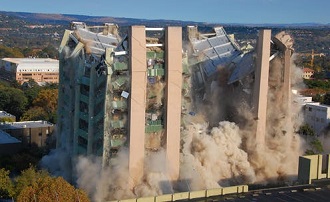 Monday, May 20, 2024
Monday, May 20, 2024  Monday, May 20, 2024
Monday, May 20, 2024 
We are entering a new world where skyscrapers and other huge buildings are becoming redundant and need significant overhaul or replacement. The process is called unbuilding or, if you’re a bit highfalutin, deconstruction.
These so-called spreadsheet towers populate every major city. They signalled modernity and provided huge profits for those who built them. But these buildings are profligate users of fuels for light, power and services.
Most developed world cities started building skyscrapers after the second world war. These buildings were International Style architecture, unrecognisable is terms of a particular locale, universal in terms of their ubiquitous metal, concrete, glass – and fully air-conditioned. Now they are ageing, their use-by date is up and their balance sheet profitability no longer attracts.
The question is: how do we safely dismantle these high-rise structures, which are generally located in busy cities?
Reminders of the dangers of explosive demolition are tragedies such as the death of 12-year-old Katie Bender. She was struck by flying debris when the Royal Canberra Hospital was razed in 1997 to make way for the new National Museum of Australia.
A recent demolition, and the tallest ever to be unbuilt, is 270 Park Avenue, New York City. Its 52 floors were built in 1960 for the Union Carbide chemical company. The building was for 50 years the tallest ever designed by a female architect (Natalie de Bios of Skidmore, Owings and Merrill. Is that another low hit for gender equality?) Its replacement by architects Norman Foster will be twice as high.
The business of disassembling these skyscrapers is just now developing, but it will gain pace as more become obsolete.
Keep reading in The Conversation
Deadline for this week in Friday at noon